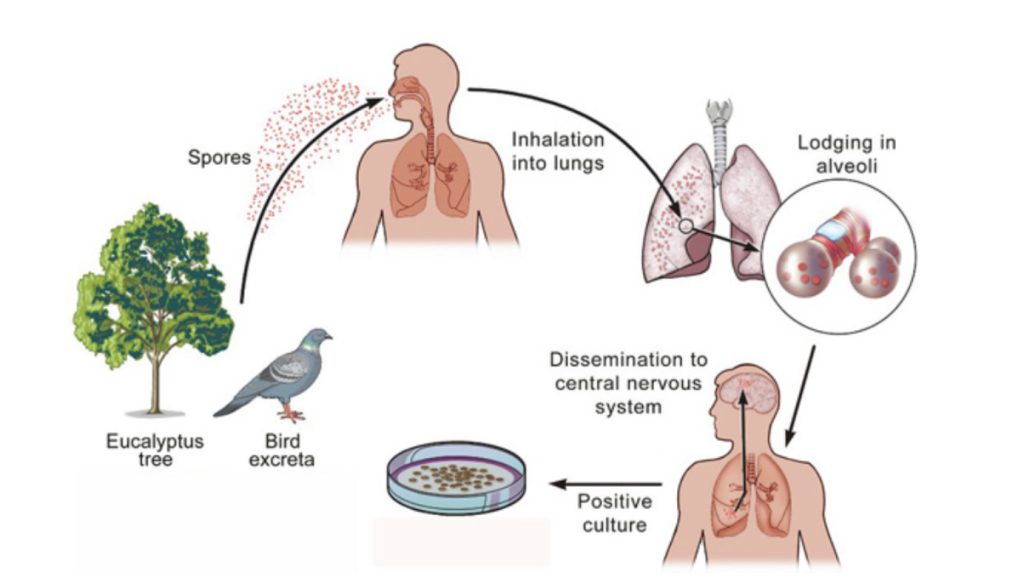HEALTH ISSUE
There are many issues associated with bird infestations that impact both people and pets. Birds can transmit over 40 diseases, including allergies, viruses, and bacteria.
The transmission of these diseases can occur through direct or indirect contact with pigeon droppings. When the droppings dry, they turn into dust, which can be inhaled by people or contaminate surfaces, water, or food. This allows the infectious agents responsible for the diseases to enter the body, potentially causing infections.

Cryptococcosis is one of the most common diseases transmitted by urban pigeons and is caused by the fungus Cryptococcus neoformans, which thrives in pigeon droppings. When the fungal spores are inhaled, they initially affect the lungs and, as the disease progresses, can spread through the bloodstream to other parts of the body, potentially reaching the nervous system and causing meningitis.
Salmonella can be transmitted when pigeon droppings dry and are carried by the wind, contaminating food. If the contaminated food is consumed without proper washing, it can transmit the disease.
Salmonella can also spread when droppings come into contact with clothing or directly with people.
Pigeons are important carriers of viruses such as the West Nile Virus and St. Louis Encephalitis. These viruses can infect the nervous system, causing symptoms that range from loss of consciousness to a potentially fatal outcome.
These forms of encephalitis are transmitted by mosquitoes, which can pass the virus to humans after biting infected pigeons.
E. Coli is a bacterium that exists in large quantities in pigeon droppings. To prevent infection, it’s important to wash hands thoroughly after being in areas frequented by pigeons, such as parks or public squares.
Histoplasmosis is a systemic infection caused by the fungus Histoplasma capsulatum. This fungus is primarily spread by pigeons and bats. Infection occurs when fungal spores are released into the environment from droppings and then inhaled. Histoplasmosis can also affect livestock and certain wild animals.
This is an allergic reaction to bird feathers. Symptoms may resemble a cold, including inflammation of the lung alveoli, coughing, and even difficulty breathing.
Psittacosis is an infection caused by the bacterium Chlamydia psittaci, commonly found in pigeons and other birds. It is transmitted to humans through direct contact with dry droppings or respiratory secretions from birds. The bacterium enters the respiratory system and spreads through the bloodstream, reaching the lungs, spleen, or liver, potentially causing severe health problems.
Pigeons can carry the bacterium Coxiella burnetii, which causes Q fever. This fever also affects livestock, and infected animals spread the bacteria through their urine and feces.
Recommendations for preventing diseases
To reduce the risk of infection:
- Avoid touching birds directly, and if contact occurs, wash your hands thoroughly afterward;
- Avoid exposure to bird feathers, droppings, and dust;
- If you have a weakened immune system, respiratory issues, or allergies, avoid handling birds or their droppings.
Remover Excrementos
- Avoid direct contact, and wash your hands and any exposed areas of your body afterward;
- Wear protective clothing such as disposable coveralls, gloves, and a mask. For added protection, use a respirator. After cleaning, wash any clothing worn during the process;
- Before cleaning, spray water over the droppings to prevent dust formation. Plastic coverings can also be used to contain the area and prevent the spread of dust to other spaces;
- Collect the moistened droppings in a plastic bag or other secure container and dispose of them in the trash.
